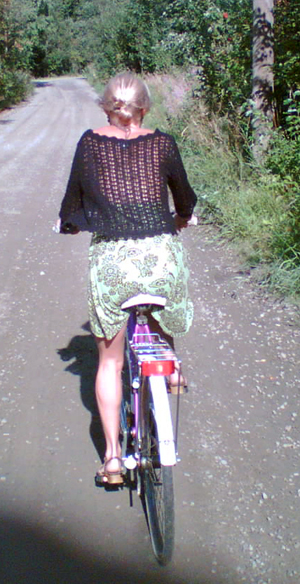Before last year, I had practically zero singing experience. However, since I moved to Victoria, it has gradually become a big passion of mine. In the spring I was taken along to sing in a few groups around town, and the highlight of these first choral experiences was singing Durufle’s Requiem last summer. That piece had such a hard soprano part that I realised I would need to do some practice in order for my voice to manage it. As I started doing some personal singing practice – first time in my life – I noticed two things: a) my singing was improving and b) I really enjoyed it. I was hooked! When the Durufle concert was over, I longed to carry on my singing and developing it, but didn’t quite know how to go about it. I felt quite shy about this (I’m a flute player, not a singer! And voice is such a personal instrument as well), and it took me a further three months to find the courage to ask around about singing lessons. But I’m so glad I finally started taking lessons and got some professional advice!
Obviously, my flute-playing background has been some advantage, as some things are similar with singing, especially breathing. It is still a completely different instrument. I am not a very patient person and would rather learn everything at once. But I had to accept that the voice cannot develop overnight. The muscles need time. One has to train one’s muscles so one can be consciously in control of them, and eventually get them to work automatically. In singing the instrument is inside one’s body, which creates an extra challenge, as one cannot see what one is doing. One has to learn to remember what doing things correctly feels like. Metaphors are a great help in this, and can be more effective than talking in technical terms. Much of the time the key is to learn to relax the muscles, and not to do any unnecessary work or movement. You need your throat, jaw and tongue as relaxed as possible for the voice to resonate freely. Listening to oneself carefully is also important. But as one can only hear how one’s own voice sounds like inside one’s head, the help of an outsider’s (in this case teacher’s) pair of ears is crucial!
Then there are the words. It is one area instrumentalists almost never need to think about. I got to discover all this wonderful poetry that goes with the songs I am singing. I don’t miss the words when I play the flute, but I do get great satisfaction out of being able to communicate all these beautiful words and meanings through singing. But the words provide a challenge of their own: learning the correct pronunciation and being able to sing them clearly, still maintaining free resonance on all different letters.
Repetition is the key for establishing any new skill, and there are no short cuts to this. Doing something once is not a quarantee one can repeat it again at any given time. It takes hundreds of repetitions for the muscles to learn something so it becomes automatic. Luckily I really enjoy the voice practising sessions with myself. Each day feels a little different: some days things seem easier than other days, the muscles or mind engage in different ways and the ear hears different things. I try to think that all these different days are needed in the process. Eventually, the goal is to gain such a control over one’s instrument, it becomes an integral part oneself and one’s expression. That whilst singing, one can solely focus on the music and the words, and the voice is an expressive and spontaneous instrument singing through you.
As I am singing purely because of personal fascination and fulfilment, I wanted to make it clear to myself this is something I must never get worked up about (plus getting worked up can get in the way of learning and tighten the muscles). Starting the journey of learning a new skill is like planting a seed and nurturing it, getting to witness it grow and develop over time. However, one has to be humble; one can only do one’s best – the plant can only grow at its own speed, and might sometimes take surprising directions. My singing tree has certainly grown since I started. And I am quite fascinated by how one’s very own voice can change, grow and develop with time and training.
One more exciting thing about singing: everyone’s instrument is unique, no two voices are the same. And when singing, one’s very own body is the instrument resonating. Singing just feels right and I am sure it releases some essential positive energy. I can’t quite understand how come everyone on this planet is not singing – it is after all the instrument everyone has!
‘Since singing is so good a thing, I wish all men would learne to sing.’ (W. Byrd)

